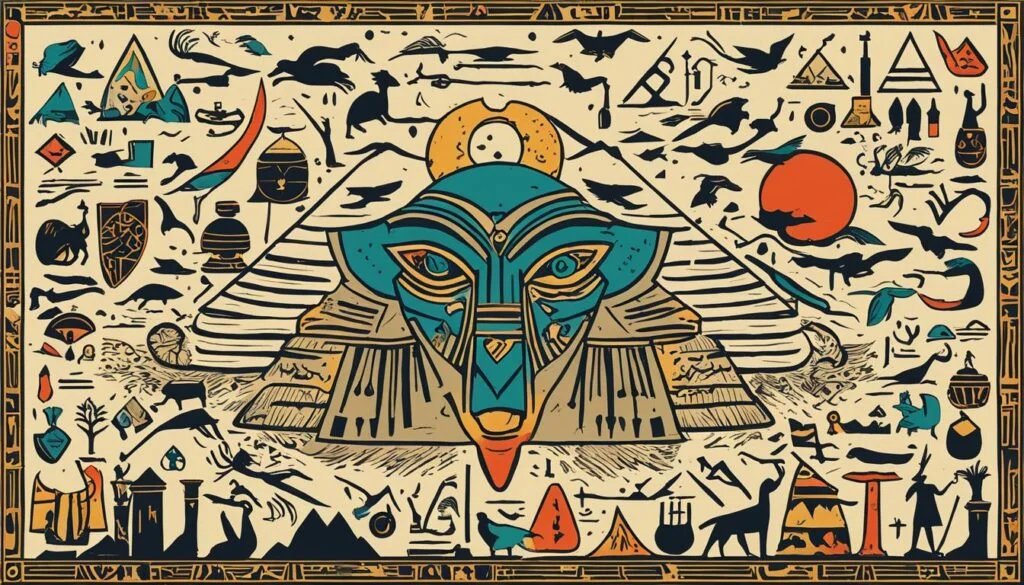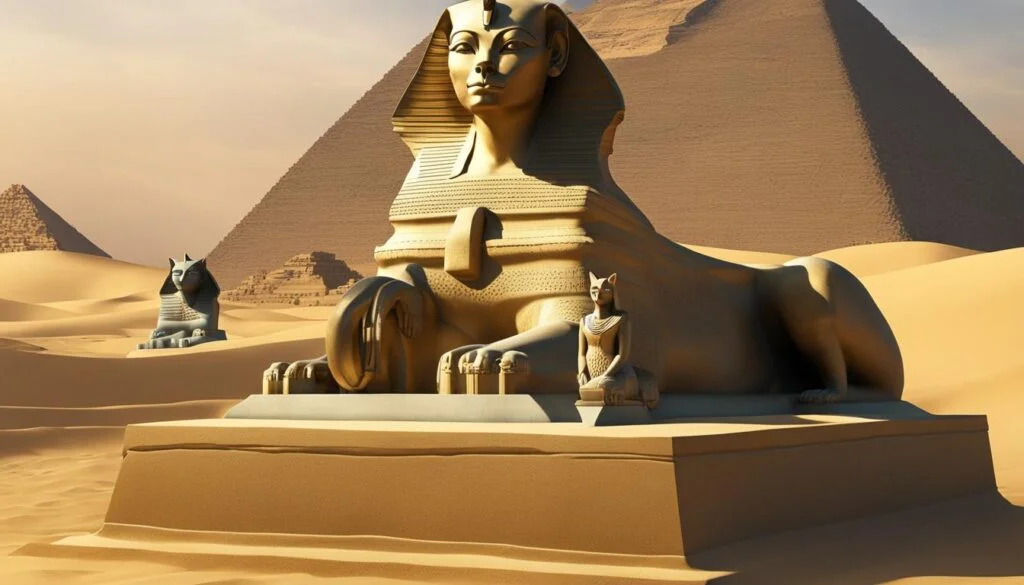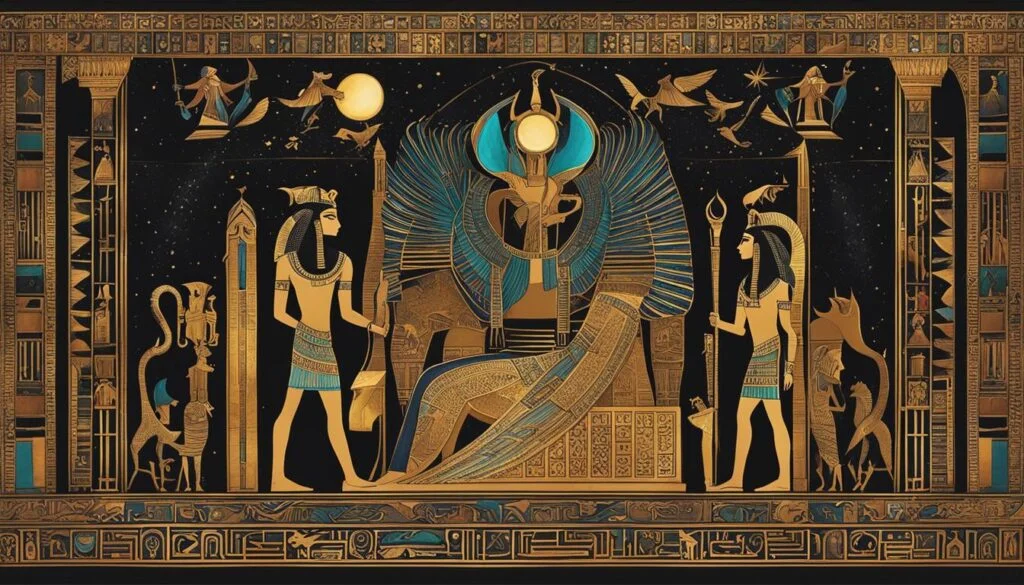The ten plagues that occurred in Egypt during the biblical narrative were believed to be demonstrations of the power of the God of Israel over the Egyptian pantheon of gods and goddesses. These plagues were sent as a means to convince Pharaoh to free the Israelites from their slavery. Each plague was directed at a specific Egyptian deity, serving as a sign of judgment and a display of God’s superiority. This connection between the plagues and the Egyptian gods is significant in understanding the historical and religious context of the biblical narrative.
Key Takeaways:
- The ten plagues in Egypt were a demonstration of the power of the God of Israel over the Egyptian gods.
- Each plague was directed at a specific Egyptian deity, serving as a sign of judgment and God’s superiority.
- The connection between the plagues and the Egyptian gods is significant in understanding the biblical narrative.
- The plagues were sent to convince Pharaoh to free the Israelites from slavery.
- Understanding the significance of the plagues in Egyptian mythology provides deeper insights into the biblical narrative.
The Ten Plagues and Their Corresponding Egyptian Gods
The ten plagues that were inflicted upon Egypt had a direct correlation to the specific Egyptian gods and goddesses. Each plague was designed to target a particular aspect of Egyptian religious belief or cultural significance. These plagues served as a powerful demonstration of God’s power and supremacy over the Egyptian deities.
Plague 1: The Turning of the Water into Blood
This plague was a direct challenge to Hapi, the Egyptian god of the Nile. The water of the Nile River, which was a lifeline for the Egyptians, was transformed into blood, causing significant disruption and devastation.
Plague 2: The Plague of Frogs
During this plague, swarms of frogs invaded Egypt, which was an affront to Heket, the goddess of fertility and water. Frogs were considered sacred creatures in ancient Egypt, and their abundance during this plague brought chaos and discomfort to the people.
Plague 3: The Plague of Gnats or Lice
By bringing forth gnats or lice, God challenged Geb, the god of the earth. The prevalence of these tiny pests would have caused great annoyance and discomfort for the Egyptians.
Plague 4: The Swarms of Flies
This plague targeted both Re, the sun god, and Hathor, the goddess of protection. The swarms of flies that infested Egypt would have been seen as a lack of divine protection and a sign of Re’s powerlessness.
Plague 5: The Death of Livestock
This plague impacted Hathor, the goddess of love, beauty, and fertility, who was often depicted with the head of a cow. The sudden death of livestock would have been a devastating blow to the Egyptians, as it would have resulted in economic losses and food scarcity.
Plague 6: The Boils
This plague targeted Sekhmet, the goddess of healing and plagues. The infliction of painful boils on the Egyptians would have been a direct challenge to the healing powers of Sekhmet.
Plague 7: The Hail and Thunderstorm
This plague challenged Nut, the sky goddess, and Set, the god of storms. The hail and thunderstorm that devastated Egypt would have shaken the belief in the gods’ ability to protect and control the forces of nature.
Plague 8: The Plague of Locusts
This plague targeted Iris, the goddess of fertility and agriculture. The swarms of locusts devoured the crops, jeopardizing Egypt’s food supply and challenging Iris’ role as the provider of abundance.
Plague 9: The Darkness
This plague directly challenged Ra, the sun god. Darkness engulfed Egypt for three days, symbolizing the powerlessness of Ra and the inability of the gods to control the natural order of the universe.
Plague 10: The Death of the Firstborn
This final plague took aim at Osiris, the god of the underworld and the afterlife. The death of the firstborn in every Egyptian household was a devastating blow to Osiris’ power and authority.
These ten plagues served as a powerful display of God’s supremacy over the Egyptian gods. They not only brought about physical devastation but also challenged and undermined the beliefs and cultural significance of the ancient Egyptian civilization.
The Significance of the Ten Plagues in Egyptian Mythology
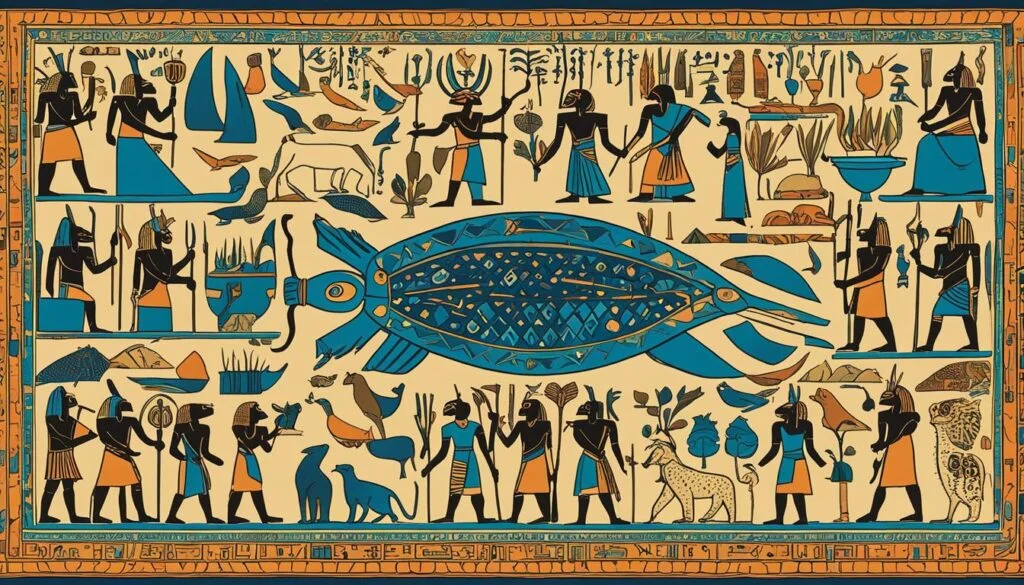
In Egyptian mythology, each deity represented a different aspect of life, nature, or divine power. The ten plagues were specifically chosen to target these various aspects of Egyptian belief, effectively challenging and undermining the power of the Egyptian gods.
For example, the plague of flies was a direct assault on the authority of Re, the sun god, and Hathor, the goddess of protection. The infestation of flies was not only a nuisance but also a symbolic representation of chaos and decay, contrasting with the usual order and harmony associated with these deities. This plague was a demonstration of the superiority of the God of Israel over these Egyptian gods, highlighting their powerlessness in the face of divine judgment.
Similarly, the plague of darkness, which engulfed the land for three days, was a direct challenge to Amun-Ra, the king of the gods and the personification of the sun. This supernatural darkness was a manifestation of chaos and a disruption of the natural order, once again undermining the authority and power of the Egyptian deities.
The plagues were not just a series of random events; they were carefully selected to target specific Egyptian gods, revealing their inefficacy and inferiority compared to the God of Israel. Through these plagues, the biblical narrative portrays the triumph of monotheism and the superiority of the God of Israel over the polytheistic beliefs of ancient Egypt.
The Biblical Narrative and the Plague Symbolism
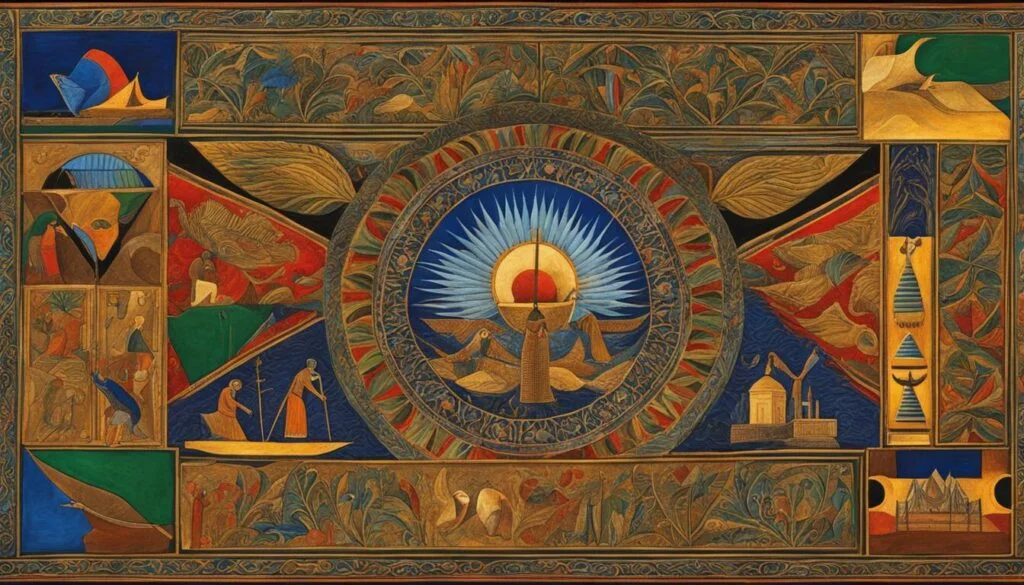
The biblical narrative of the ten plagues in Egypt serves as a symbolic representation of the conflict between the God of Israel and the Egyptian pantheon of gods. Each plague was carefully chosen to challenge and undermine a specific aspect of Egyptian religious belief and cultural significance.
The plagues were not just acts of judgment and punishment; they were also powerful demonstrations of the power and authority of the God of Israel. With each plague, God was displaying His superiority over the false gods of Egypt, asserting His divine sovereignty.
The plagues hold great religious symbolism, conveying theological and spiritual messages. They highlight the undeniable power of the God of Israel and His ability to bring about extraordinary events and miracles. Through this narrative, the biblical text emphasizes the superiority of the one true God over the Egyptian deities, establishing His supreme position.
- The Blood: This plague challenged the authority of Hapi, the Egyptian god of the Nile, demonstrating that the God of Israel had power over the life-giving waters.
- The Frogs: The plague of frogs undermined the goddess Heket, who was associated with fertility and water, emphasizing the God of Israel’s control over creation.
- The Lice/Gnats: This plague defied the Egyptian god Geb, who was believed to be the deity responsible for the dust of the earth, revealing God’s dominion over all elements.
- The Flies: By bringing vast numbers of flies, this plague challenged the authority of Re, the sun god, and Hathor, the goddess of protection, showcasing the God of Israel’s supremacy.
- The Pestilence: This plague targeted Apis, the bull god, and Hathor, emphasizing that God ruled over the life and death of all creatures.
- The Boils: By afflicting the Egyptians with painful skin boils, this plague challenged Isis, the goddess of healing, showing that God alone controlled health and well-being.
- The Hail: This plague defied Nut, the sky goddess, and Seth, the storm god, exhibiting God’s mastery over nature and its destructive forces.
- The Locusts: These insects ravaged the land, challenging Osiris, the god of vegetation, and demonstrating that God controlled the food supply.
- The Darkness: This plague challenged Ra, the sun god, revealing that the God of Israel had power over light and darkness, the very essence of existence.
- The Death of the Firstborn: The final plague struck at the heart of Egyptian society, challenging Pharaoh’s divine status and undermining the divine protection of the god Horus.
The connection between the biblical narrative and the symbolism behind the plagues deepens our understanding of the theological and spiritual messages conveyed in this compelling story. It showcases the power and supremacy of the God of Israel over the Egyptian gods, instilling faith and reinforcing the unique significance of the biblical narrative in religious and cultural contexts.
Lessons Learned from the Plagues in Egypt
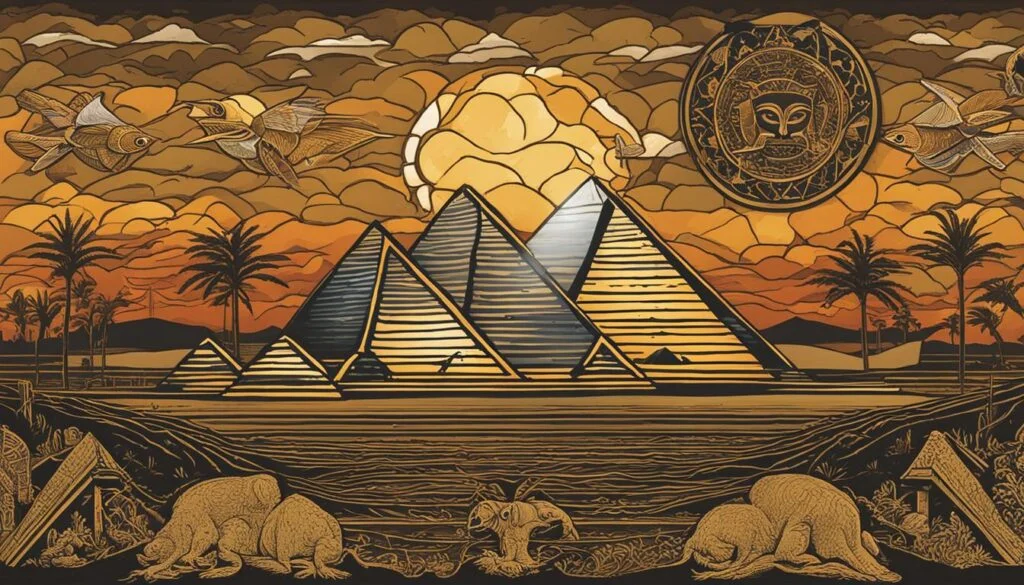
The plagues in Egypt, as depicted in the biblical narrative, hold valuable lessons for us today. They serve as powerful demonstrations of God’s power, sovereignty, and desire for His people to worship Him alone. Let us delve into the spiritual significance and theological messages conveyed through these extraordinary events.
- The Power and Sovereignty of God: The plagues illustrate the unmatched power of the God of Israel over the gods of Egypt. Through the plagues, God showed His authority and ability to bring about both blessings and judgments. This reminds us of the divine nature of God and His dominion over all creation.
- The Consequences of Disobedience: The plagues serve as a stark reminder of the consequences of disobedience. Pharaoh’s refusal to let the Israelites go led to the affliction of the Egyptian people and the depletion of their resources. This teaches us the importance of obedience and the repercussions that can arise from rebellion.
- The Importance of Repentance: Throughout the plagues, Pharaoh had opportunities to repent and acknowledge the power of the God of Israel. However, his hardened heart prevented him from doing so, prolonging the suffering of the Egyptian people. This highlights the significance of repentance and the need to turn to God with humility and contrition.
- The Uniqueness of the God of Israel: The plagues emphasized the superiority of the God of Israel over the Egyptian gods. Each plague targeted a specific deity, revealing the powerlessness of the Egyptian pantheon. This underlines the uniqueness of the God of Israel and His ability to deliver His people from bondage.
- God’s Faithfulness and Miracles: Through the plagues, God demonstrated His unwavering faithfulness to His covenant with the Israelites. He performed awe-inspiring miracles, such as the parting of the Red Sea, to deliver His people from slavery. This reminds us of God’s faithfulness in our own lives and His ability to work miracles on our behalf.
By reflecting on these lessons from the plagues in Egypt, we can gain a deeper understanding of God’s character, His eternal truths, and the spiritual significance of the biblical narrative. It is a testament to the enduring relevance of these powerful events and the theological messages conveyed through them.
Conclusion
The connection between the biblical plagues and the Egyptian gods is a fascinating aspect of the ancient world’s dramatic narrative. Throughout the ten plagues in Egypt, the God of Israel showcased His superiority over the Egyptian pantheon. By strategically targeting specific aspects of Egyptian religious belief and cultural significance, the plagues served as a powerful message to the Egyptians.
Through the plagues, the God of Israel demonstrated His authority over the mighty Egyptian gods, challenging their power and showcasing His sovereignty. Each plague was carefully chosen to challenge and undermine a particular Egyptian deity, serving as a sign of judgment and a display of God’s supremacy. This connection between the plagues and the Egyptian gods contributes to a deeper understanding of the biblical narrative.
Furthermore, by understanding the significance of the plagues in the context of Egyptian mythology, we gain insights into the theological and spiritual messages conveyed in the biblical narrative. The plagues serve as a testament to the God of Israel’s faithfulness, His ability to perform miracles, and His desire for His people to worship Him alone. They also emphasize the consequences of disobedience and the importance of repentance.
In conclusion, the plagues in Egypt hold great significance in the biblical narrative. They serve as a powerful demonstration of the God of Israel’s superiority over the Egyptian gods, conveying theological and spiritual messages about His power and authority. By understanding the connection between the plagues, the biblical narrative, and the Egyptian gods, we gain a deeper appreciation for the historical and religious context of this dramatic event.
FAQ
What is the connection between the plagues in Egypt and the Egyptian gods?
The plagues in Egypt were believed to be demonstrations of the power of the God of Israel over the Egyptian pantheon of gods and goddesses. Each plague targeted a specific Egyptian deity and served as a sign of judgment and a display of God’s superiority.
Which Egyptian gods did the ten plagues represent?
Each plague was directed at a specific Egyptian god or goddess. For example, the turning of the water into blood challenged Hapi, the Egyptian god of the Nile, and the plague of frogs was an affront to Heket, the goddess of fertility and water. The plagues targeted various aspects of Egyptian religious belief and cultural significance.
What is the significance of the ten plagues in Egyptian mythology?
In Egyptian mythology, each deity represented a different aspect of life, nature, or divine power. The ten plagues were specifically chosen to challenge these various aspects of Egyptian belief and undermine the power of the Egyptian gods. They served as a demonstration of God’s superiority over the false gods of Egypt.
How do the plagues in Egypt relate to the biblical narrative?
The plagues in Egypt serve as a symbolic representation of the conflict between the God of Israel and the Egyptian pantheon of gods. Each plague was carefully chosen to challenge and undermine a specific aspect of Egyptian religious belief and cultural significance. The plagues demonstrate God’s power and authority over the false gods of Egypt.
What lessons can be learned from the plagues in Egypt?
The plagues illustrate the power and sovereignty of God, the consequences of disobedience, and the importance of repentance. They emphasize the uniqueness of the God of Israel and His ability to deliver His people from bondage. The plagues demonstrate God’s faithfulness, ability to perform miracles, and desire for His people to worship and serve Him alone.
What is the significance of the plagues in Egypt?
The plagues in Egypt serve as a powerful message to the Egyptians, demonstrating the superiority of the God of Israel over their pantheon of gods and goddesses. By understanding the significance of the plagues in the context of Egyptian mythology, we gain deeper insights into the theological and spiritual messages conveyed in the biblical narrative.


